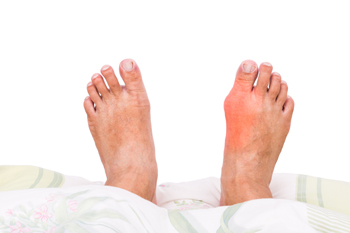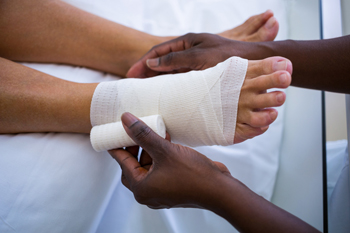
Pregnancy can often lead to water retention in the feet and ankles. Swollen feet and ankles often get worse as the due date approaches and during hot weather. There are several things that you can do that may reduce swelling in the lower limbs during pregnancy. Avoid standing for prolonged periods of time, and prop your feet up when sitting. If you sit for long periods of time, stretching and exercising regularly may help reduce swelling. Drinking plenty of water, which may sound counterintuitive, can also help reduce swelling, as water retention is often caused or worsened by dehydration. For more advice on how to manage foot and ankle swelling during pregnancy, consult with a podiatrist.
Pregnant women with swollen feet can be treated with a variety of different methods that are readily available. For more information about other cures for swollen feet during pregnancy, consult with Dr. Alan J. Spector from Shore Podiatry. Our doctor will attend to all of your foot and ankle needs.
What Foot Problems Can Arise During Pregnancy?
One problem that can occur is overpronation, which occurs when the arch of the foot flattens and tends to roll inward. This can cause pain and discomfort in your heels while you’re walking or even just standing up, trying to support your baby.
Another problem is edema, or swelling in the extremities. This often affects the feet during pregnancy but tends to occur in the later stages.
How Can I Keep My Feet Healthy During Pregnancy?
If you have any questions please feel free to contact our office located in Point Pleasant, NJ . We offer the newest diagnostic and treatment technologies for all your foot and ankle needs.
 Bunionettes, also known as Tailor’s bunions, are bony protrusions at the base of the little toe on the outside of the foot. Like bunions, bunionettes are a deformity that can cause discomfort and pain when anything rubs against them. Bunionettes are usually caused by wearing shoes that constrict the foot, such as high heels or shoes with pointed toes. They can also be caused by genetics, arthritis, or a misalignment of the foot. Treatments for this condition include wearing comfortable, supportive shoes with wide toe boxes and wearing special pads that reduce pain from the bunionette. In very severe cases, surgery may be needed to remove the bunionette or to realign the bone of the pinky toe. If you suffer from bunionettes, it is suggested that you see a podiatrist for treatment.
Bunionettes, also known as Tailor’s bunions, are bony protrusions at the base of the little toe on the outside of the foot. Like bunions, bunionettes are a deformity that can cause discomfort and pain when anything rubs against them. Bunionettes are usually caused by wearing shoes that constrict the foot, such as high heels or shoes with pointed toes. They can also be caused by genetics, arthritis, or a misalignment of the foot. Treatments for this condition include wearing comfortable, supportive shoes with wide toe boxes and wearing special pads that reduce pain from the bunionette. In very severe cases, surgery may be needed to remove the bunionette or to realign the bone of the pinky toe. If you suffer from bunionettes, it is suggested that you see a podiatrist for treatment.
If you are suffering from bunions, contact Dr. Alan J. Spector of Shore Podiatry. Our doctor can provide the care you need to keep you pain-free and on your feet.
What Is a Bunion?
A bunion is formed of swollen tissue or an enlargement of boney growth, usually located at the base joint of the toe that connects to the foot. The swelling occurs due to the bones in the big toe shifting inward, which impacts the other toes of the foot. This causes the area around the base of the big toe to become inflamed and painful.
Why Do Bunions Form?
Genetics – Susceptibility to bunions are often hereditary
Stress on the feet – Poorly fitted and uncomfortable footwear that places stress on feet, such as heels, can worsen existing bunions
How Are Bunions Diagnosed?
Doctors often perform two tests – blood tests and x-rays – when trying to diagnose bunions, especially in the early stages of development. Blood tests help determine if the foot pain is being caused by something else, such as arthritis, while x-rays provide a clear picture of your bone structure to your doctor.
How Are Bunions Treated?
If you have any questions, please feel free to contact our office located in Point Pleasant, NJ . We offer the newest diagnostic and treatment technologies for all your foot care needs.
 Diabetes is a condition that can require professional assistance in maintaining the health of the feet for those affected. It can be common for those with diabetes to develop foot ulcers. These are slow healing, deep wounds, that if left untreated, can become badly infected. Infections can lead to serious complications, and in severe cases, may require amputation. Diabetes can often affect the nerves in the feet, causing them to lose feeling, which is why many patients let their wounds go untreated. To help prevent wounds from getting infected, please consult with a podiatrist for regular screenings.
Diabetes is a condition that can require professional assistance in maintaining the health of the feet for those affected. It can be common for those with diabetes to develop foot ulcers. These are slow healing, deep wounds, that if left untreated, can become badly infected. Infections can lead to serious complications, and in severe cases, may require amputation. Diabetes can often affect the nerves in the feet, causing them to lose feeling, which is why many patients let their wounds go untreated. To help prevent wounds from getting infected, please consult with a podiatrist for regular screenings.
Wound care is an important part in dealing with diabetes. If you have diabetes and a foot wound or would like more information about wound care for diabetics, consult with Dr. Alan J. Spector from Shore Podiatry. Our doctor will assess your condition and provide you with quality foot and ankle treatment.
What Is Wound Care?
Wound care is the practice of taking proper care of a wound. This can range from the smallest to the largest of wounds. While everyone can benefit from proper wound care, it is much more important for diabetics. Diabetics often suffer from poor blood circulation which causes wounds to heal much slower than they would in a non-diabetic.
What Is the Importance of Wound Care?
While it may not seem apparent with small ulcers on the foot, for diabetics, any size ulcer can become infected. Diabetics often also suffer from neuropathy, or nerve loss. This means they might not even feel when they have an ulcer on their foot. If the wound becomes severely infected, amputation may be necessary. Therefore, it is of the upmost importance to properly care for any and all foot wounds.
How to Care for Wounds
The best way to care for foot wounds is to prevent them. For diabetics, this means daily inspections of the feet for any signs of abnormalities or ulcers. It is also recommended to see a podiatrist several times a year for a foot inspection. If you do have an ulcer, run the wound under water to clear dirt from the wound; then apply antibiotic ointment to the wound and cover with a bandage. Bandages should be changed daily and keeping pressure off the wound is smart. It is advised to see a podiatrist, who can keep an eye on it.
If you have any questions, please feel free to contact our office located in Point Pleasant, NJ . We offer the newest diagnostic and treatment technologies for all your foot care needs.
The body’s nervous system is composed of two parts: the central nervous system, which consists of the brain and spinal cord, and the peripheral nervous system, which consists of the nerves running from the brain and spinal cord to the rest of the body. Peripheral neuropathy is a disorder that occurs when the nerves of the peripheral nervous system are damaged or destroyed, impairing the relay of messages from the brain and spinal cord to the other parts of the body. The peripheral nerves travel to the arms, hands, legs, and feet. When these nerves are damaged, you may experience numbness and pain in these areas. Peripheral neuropathy that affects the lower limbs can be especially concerning, as it can cause difficulty walking and a loss of sensation that makes foot wounds and infections more likely to develop. If you are experiencing the symptoms of peripheral neuropathy in your lower limbs, it is suggested that you seek the care of a podiatrist.
Neuropathy
Neuropathy can be a potentially serious condition, especially if it is left undiagnosed. If you have any concerns that you may be experiencing nerve loss in your feet, consult with Dr. Alan J. Spector from Shore Podiatry. Our doctor will assess your condition and provide you with quality foot and ankle treatment for neuropathy.
What Is Neuropathy?
Neuropathy is a condition that leads to damage to the nerves in the body. Peripheral neuropathy, or neuropathy that affects your peripheral nervous system, usually occurs in the feet. Neuropathy can be triggered by a number of different causes. Such causes include diabetes, infections, cancers, disorders, and toxic substances.
Symptoms of Neuropathy Include:
Those with diabetes are at serious risk due to being unable to feel an ulcer on their feet. Diabetics usually also suffer from poor blood circulation. This can lead to the wound not healing, infections occurring, and the limb may have to be amputated.
Treatment
To treat neuropathy in the foot, podiatrists will first diagnose the cause of the neuropathy. Figuring out the underlying cause of the neuropathy will allow the podiatrist to prescribe the best treatment, whether it be caused by diabetes, toxic substance exposure, infection, etc. If the nerve has not died, then it’s possible that sensation may be able to return to the foot.
Pain medication may be issued for pain. Electrical nerve stimulation can be used to stimulate nerves. If the neuropathy is caused from pressure on the nerves, then surgery may be necessary.
If you have any questions, please feel free to contact our office located in Point Pleasant, NJ . We offer the newest diagnostic and treatment technologies for all your foot care needs.